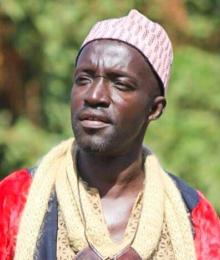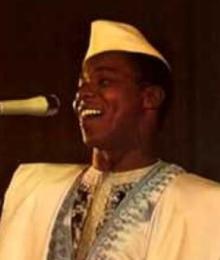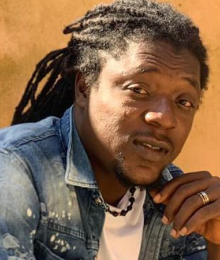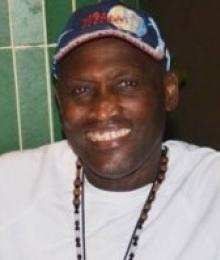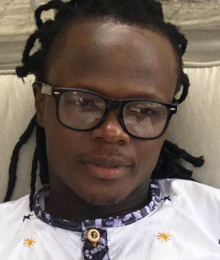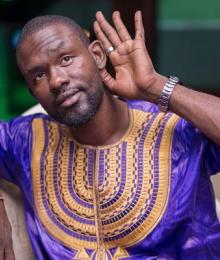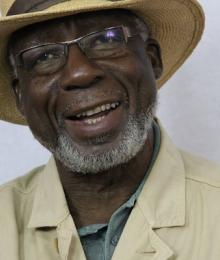
Souleymane Koly Kourouma was an iconic figure in African performing arts, born on August 18, 1944, in Nzérékoré, Guinea, and passed away on August 1, 2014, in Conakry. A playwright, director, choreographer, dancer, musician, filmmaker, and producer with a strong pan-African conviction, he transformed the African cultural landscape by founding the Ensemble Kotéba of Abidjan in 1974—a troupe blending theater, music, and dance—as well as Les Go de Kotéba in 1993.
After studying sociology in France, he settled in Côte d'Ivoire, where he developed an artistic vision deeply rooted in contemporary African urban realities while drawing from traditional influences. His creations, which insightfully addressed the sociopolitical challenges of the continent, achieved international success, establishing him as a sought-after consultant for various international organizations and a key ambassador of modern African culture.
Introduction
Souleymane Koly Kourouma, an iconic figure in African performing arts, has left an indelible mark on the continent's cultural history through his innovative vision and unwavering commitment to promoting African arts. As a playwright, director, choreographer, musician, and visionary producer, he successfully bridged tradition and modernity while developing a distinctive artistic language firmly rooted in African urban realities.
The Beginnings of a Complete Artist
Born on August 18, 1944, in Nzérékoré in southeastern Guinea, Souleymane Koly grew up in an environment rich in cultural traditions. As a teenager, he spent his vacations attending theatrical performances in Sékou Touré's revolutionary Guinea, an experience that would shape his future artistic vision.
After obtaining his scientific baccalaureate, he left Guinea for France in the 1960s. In Paris, while pursuing sociology studies that would lead to a diploma from the Center for Literary Studies and Applied Sciences, he formed the Ensemble Kaloum Tam Tam with friends, the first manifestation of his artistic commitment.
Settling in Ivory Coast and the Foundations of a Vision
In November 1971, Souleymane Koly settled with his family in Abidjan, the economic capital of Ivory Coast. This bustling city, a symbol of the rapid urbanization of West Africa, became the crucible of his artistic vision. Appointed director of the Department of Arts and Popular Traditions at the National Institute of Arts in Abidjan, he worked there from 1971 to 1973.
Within this structure, he attempted to implement ideas that would later form the conceptual foundations of his work. For him, the department should not merely be a place for collecting and archiving popular traditions but rather a catalyst for "Ivorianizing" artistic education and creation. He established three units: a cell for musical research and creation, another for visual arts, and a third dedicated to performing arts.
Faced with administrative resistance, he left the Institute in 1973 to join the Ministry of Planning as a sociologist, a position he would hold until 1984. This diverse professional experience nourished his understanding of social dynamics that would later be reflected in his artistic creations.
The Ensemble Kotéba: A Cultural Revolution
In 1974, Souleymane Koly founded the Ensemble Kotéba of Abidjan, a troupe that would become one of the most influential and popular companies in West Africa. The name "Kotéba" is rich in meaning: in Bambara, "Koté" means snail and "Ba" means big. This term refers to a form of traditional Malian theater that combines theater, music, and dance, with a satirical dimension that critiques social shortcomings.
Koly's originality lay in his ability to reinvent this tradition by firmly anchoring it in contemporary urban reality. As he himself explained: "We are explicitly inscribed from the outset in the problematic of the African city with its new emerging culture." The themes of his creations were drawn from the daily life of Abidjan's popular neighborhoods, reflecting the social changes, hopes, and difficulties of African youth at the crossroads of local and global influences.
The distinctive style of the Ensemble Kotéba is characterized by several elements:
- A discourse anchored in the present and urban reality
- The use of African languages and popular French
- The use of all performing arts: theater, dance, music, singing, mime
- Entirely "live" performances with large casts
- Accessibility for all, both as spectators and as potential actors
International Success and Prolific Production
From 1974 until his passing, Souleymane Koly and the Ensemble Kotéba created a rich and diverse body of work. Among the most notable productions are:
- "L'Appel du tamtam" (1974)
- "Adama Champion" (1981)
- "Fanico" (1982)
- "Cocody Johnny" (co-written with Koffi Kwahulé)
- "Commandant Jupiter & ses Blacks Nouchis"
- "Eh, Didi Yako"
- "Waramba, Opéra mandingue" (1991)
- "Funérailles Tropicales"
- "Navetanes"
- "Dozo, la colère de la brousse"
- "La Cour" (2002)
Through these creations, Koly sharply addressed the social and political problems of the African continent, denouncing abuses of power, questioning the illusions of modernity, while valorizing certain aspects of tradition.
The Ensemble Kotéba achieved resounding success that took it throughout Africa and beyond. After a first European tour at the Nancy Festival in Fouard in 1980, the troupe performed at Beaubourg in 1982, then in North America, the Pacific Ocean region, and all over Europe. The company even undertook long residencies abroad, notably in Nouméa in New Caledonia and in Uzès in France, where it remained for an entire year in 1988-1989.
A Talent for Discovery and Training
One of Souleymane Koly's great strengths was his ability to detect and develop talent. Often described as an "artist breeder," he recruited most of his collaborators directly from society, without them necessarily having received prior artistic training. Thanks to his discerning eye and fertile imagination, he shaped remarkable comedians like Gondo (nicknamed by the newspaper Libération "the African De Funès"), Mamie Foutou, or the character of Ancien, the former tirailleur (colonial soldier).
His troupe became a place of meeting and exchange, emphasizing training, with creation as a group dynamic. Many internationally renowned African artists such as Manu Dibango, Ali Farka Touré, Ray Lema, the djembefola Mamady Keïta, or Amara Kanté collaborated with the Ensemble Kotéba, mutually enriching their artistic universes.
Diversification and New Projects
Over the years, the Kotéba enterprise diversified with the creation of two new formations within the structure:
In 1993, Souleymane Koly founded Les Go de Kotéba ("the girls of the big snail"), a female musical trio composed of Niama Kanté (Guinean), Awa Sangho (Malian), and Maaté Keïta (Ivorian-Guinean). These three young women, integrated into the main troupe at a very young age, distinguished themselves by their talents for music and singing. The group recorded several successful albums: "Les Go de Kotéba" (1997), "Dan Gna" (1999) - with the participation of Angélique Kidjo -, "Faso den" (2000), and after Niama Kanté's departure, "WAF: West African Feelings" (2006) as a duo.
In parallel, he developed the Young Ballet of Black Africa (J-BAN), a contemporary dance formation directed by Rokya Koné, his longtime choreographic assistant.
In 1987, Souleymane Koly participated in the film "La Vie Platinée" by Claude Cadiou, a feature film inspired by his creation "Didi par-ci, Didi par-là," for which the Ensemble Kotéba provided original music, choreography, and part of the financing. In 1998, he created with Dominique Guihot the character of "Moussa le Taximan" for a series directed by Henri Duparc and Maka Sidibé.
Recognition and Pan-African Commitment
By the mid-1980s, Souleymane Koly's reputation extended beyond the strictly artistic framework. He became a consultant to various international organizations including UNESCO and the European Economic Community, as well as to several African governments.
Deeply Pan-Africanist, he worked all his life for the influence of African cultures and their international recognition. His work built bridges between traditions and modernity, between Africa and the world, while remaining deeply rooted in the social realities of the continent.
Return to Roots and Final Years
In 2011, animated by the hope of a more democratic Guinea under the presidency of Alpha Condé, Souleymane Koly decided to return to his native country. He accepted the position of Principal Advisor for International Cultural Development at the Ministry of Culture. However, disappointed by institutional immobility, he quickly withdrew to devote himself entirely to his artistic activities.
On Friday, August 1, 2014, a few days before his 70th birthday, Souleymane Koly died of a heart attack at his home in Lambandji, in the suburbs of Conakry. His passing marked the end of an important chapter in African cultural history, but his legacy continues to inspire the generations of artists who have succeeded him.
A Lasting Legacy
Souleymane Koly's work constitutes an invaluable cultural heritage for Africa and the world. By creating theater that is both popular and demanding, both rooted in African traditions and turned toward modernity, he paved the way for many contemporary creators.
His unique formula combining theater, dance, and music, his sharp eye on African social realities, and his talent for revealing and training artists make him one of the most important figures on the African cultural scene of the late 20th century.
More than just an artist, Souleymane Koly was a visionary who, in his own words, sought to "conjugate Africa in the future tense." His work continues to resonate today, a living testimony to a creative, dynamic Africa resolutely turned toward the future.















